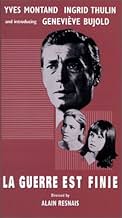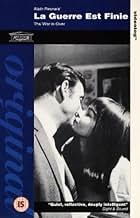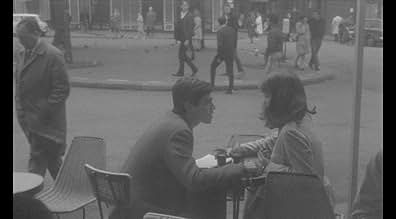La guerre est finie
- 1966
- Tous publics
- 2h 1m
IMDb RATING
7.3/10
2.6K
YOUR RATING
A veteran Republican fighter's ardent dedication to overthrow of Franco's regime is challenged. He realizes that the center of political struggle has shifted away from him, and is forced to ... Read allA veteran Republican fighter's ardent dedication to overthrow of Franco's regime is challenged. He realizes that the center of political struggle has shifted away from him, and is forced to make choices about his life and political ideals.A veteran Republican fighter's ardent dedication to overthrow of Franco's regime is challenged. He realizes that the center of political struggle has shifted away from him, and is forced to make choices about his life and political ideals.
- Nominated for 1 Oscar
- 4 wins & 4 nominations total
- Director
- Writer
- All cast & crew
- Production, box office & more at IMDbPro
Featured reviews
Many folks who watch this film today might be a bit confused about the context, so I'll try to explain. When the Spanish Republican army was defeated by Francisco Franco's troops at the end of the Spanish Civil War in the late 1930s, many Republicans (many of whom were communists and socialists) were jailed or killed--and many more poured over the border into exile in countries like France.
The character Yves Montand plays in this film, Diego Mora, is one of these communist exiles--one who regularly sneaks back and forth between the countries on missions for his cause. Exactly what he does on these missions is never talked about very much in these films but he and his comrades are trying to keep alive a small dissident group within Spain. However, during one of these many trips, he is taken in for questioning at the border. Somehow the police have become suspicious but with the help of a young French lady (Genevieve Bujold) he's able to extricate himself from custody. But, others in the organization weren't so lucky and were arrested. Because of this, Mora plans on returning to Spain to try to alert others in his cell so they can escape. However, instead of doing this, he spends so much of the film doing nothing in particular. In fact, that is a HUGE problem with the film. He learns about the possible leak in his organization and the arrests early on in the film and yet doesn't return to help the other agents until about 90 minutes later. In the interim, he meets with several women he cares about or wishes to have sex* with before his return to Spain. In addition, he talks and talks and talks--too much to keep the film interesting or well-paced. Overall, an interesting and well acted curio--especially since Montand himself was a communist and much of the story seems ironic in light of his own background as an Italian expatriate. But not a particularly enjoyable curio.
*Oddly, the first sex scene in the film was one of the most unintentionally funny I have ever seen. Instead of showing any real skin, the camera kept showing everything BUT--and with all sorts of artsy angles and composition. It made me laugh and seemed bizarre in light of the very ordinary and non-prudish sex scene later in the film. Why they did this, I have no idea. Perhaps the first nude scene (with Bujold) was done this way because she was uncomfortable with nudity and I'd sure love to know why they handled it in such a silly manner.
The character Yves Montand plays in this film, Diego Mora, is one of these communist exiles--one who regularly sneaks back and forth between the countries on missions for his cause. Exactly what he does on these missions is never talked about very much in these films but he and his comrades are trying to keep alive a small dissident group within Spain. However, during one of these many trips, he is taken in for questioning at the border. Somehow the police have become suspicious but with the help of a young French lady (Genevieve Bujold) he's able to extricate himself from custody. But, others in the organization weren't so lucky and were arrested. Because of this, Mora plans on returning to Spain to try to alert others in his cell so they can escape. However, instead of doing this, he spends so much of the film doing nothing in particular. In fact, that is a HUGE problem with the film. He learns about the possible leak in his organization and the arrests early on in the film and yet doesn't return to help the other agents until about 90 minutes later. In the interim, he meets with several women he cares about or wishes to have sex* with before his return to Spain. In addition, he talks and talks and talks--too much to keep the film interesting or well-paced. Overall, an interesting and well acted curio--especially since Montand himself was a communist and much of the story seems ironic in light of his own background as an Italian expatriate. But not a particularly enjoyable curio.
*Oddly, the first sex scene in the film was one of the most unintentionally funny I have ever seen. Instead of showing any real skin, the camera kept showing everything BUT--and with all sorts of artsy angles and composition. It made me laugh and seemed bizarre in light of the very ordinary and non-prudish sex scene later in the film. Why they did this, I have no idea. Perhaps the first nude scene (with Bujold) was done this way because she was uncomfortable with nudity and I'd sure love to know why they handled it in such a silly manner.
"Patience and irony are the chief virtues of a Bolshevik."
Beautifully shot, with splashes of visual flair, like the fast edits or the scenes with the exquisite shimmering of light on the ceiling, an echo of the haze of looking back on a life of an underground struggle against fascism in Spain following the Civil War. The film highlights the need for perseverance, brotherhood, and sacrifice over the long haul to achieve regime change, as well as the melancholy that comes from perceiving that at some point one's own personal "war" may be over, but the movement will continue on in younger hands.
I loved the idea of it, but unfortunately, the story is about as dry as toast, and it takes far too long to get to the most interesting bit, which was the old guard revolutionary (Yves Montand) confronted with newer radicals who disagree with him on tactics. I wish that part had been more developed. There is just too much time spent on mundane aspects beforehand, the details for which were rather muddled, to sustain a two hour film. Even the presence of Geneviève Bujold and Ingrid Thulin couldn't save it from being a dull affair, and how Resnais shot the love scene between Bujold and Montand in such a (nearly comical) artsy way didn't help matters. As an exercise in filmmaking and with these stars, it holds some level of interest, but it's hard to see how anyone could get excited over it. Seeing it once was enough.
Beautifully shot, with splashes of visual flair, like the fast edits or the scenes with the exquisite shimmering of light on the ceiling, an echo of the haze of looking back on a life of an underground struggle against fascism in Spain following the Civil War. The film highlights the need for perseverance, brotherhood, and sacrifice over the long haul to achieve regime change, as well as the melancholy that comes from perceiving that at some point one's own personal "war" may be over, but the movement will continue on in younger hands.
I loved the idea of it, but unfortunately, the story is about as dry as toast, and it takes far too long to get to the most interesting bit, which was the old guard revolutionary (Yves Montand) confronted with newer radicals who disagree with him on tactics. I wish that part had been more developed. There is just too much time spent on mundane aspects beforehand, the details for which were rather muddled, to sustain a two hour film. Even the presence of Geneviève Bujold and Ingrid Thulin couldn't save it from being a dull affair, and how Resnais shot the love scene between Bujold and Montand in such a (nearly comical) artsy way didn't help matters. As an exercise in filmmaking and with these stars, it holds some level of interest, but it's hard to see how anyone could get excited over it. Seeing it once was enough.
Resnais really impressed me with this film. He uses real locations and finds subtle atmospheric things that almost never turn up in movies. One sees the way a shadow of a tree moves gently back and forth on the wall as two people relax in bed, the way a gust of wind briefly animates a woman's hair in a subway tunnel.
The movie successfully combines an account of resistance to Franco's Spain from an ex-patriot living in Paris (played by Montand), and his life outside of politics. We see not only his political views, but also how he feels about love and his own situation. Beautiful, brave and innovative, this movie also has some of the most passionate, yet restrained and overall fascinating love scenes that I have seen since Peter Sellers and Shirley Maclaine in 'Being There.'
The movie successfully combines an account of resistance to Franco's Spain from an ex-patriot living in Paris (played by Montand), and his life outside of politics. We see not only his political views, but also how he feels about love and his own situation. Beautiful, brave and innovative, this movie also has some of the most passionate, yet restrained and overall fascinating love scenes that I have seen since Peter Sellers and Shirley Maclaine in 'Being There.'
Yves Montand is a Spaniard in exile in Paris, a Communist working for the central committee in exile in Paris, trying to jump-start the Revolution. He's very professional about what he does. But the Spanish government has arrested agents and he realizes he's grown tired of the never-ending struggle, the insistence of the committee in Paris that their view from a distance gives them better insight than the people who are stationed in Spain. His lover, Ingrid Thulin wants his child, and he indulges in.a tired rant in front of her friends./coworkers tat everything moves and nothing changes.
Montand gives a fine performance as a man growing tired of the always hopeful attitude of the revolutionaries, their insistance on working out the details of life, anxious to snatch small bits of autonomy wherever he can He has grown tired of being a good soldier who sees no end to the war. Will he remain a good soldier? Can he? And what if he cannot?
Alain Resnais movie is far more straightforward than his other works, although he does make liberal use of flashbacks and interpolative stills. With Geneviève Bujold, Jean Dasté, and Michel Piccoli.
Montand gives a fine performance as a man growing tired of the always hopeful attitude of the revolutionaries, their insistance on working out the details of life, anxious to snatch small bits of autonomy wherever he can He has grown tired of being a good soldier who sees no end to the war. Will he remain a good soldier? Can he? And what if he cannot?
Alain Resnais movie is far more straightforward than his other works, although he does make liberal use of flashbacks and interpolative stills. With Geneviève Bujold, Jean Dasté, and Michel Piccoli.
"La Guerre est Finie" aka The War is Over (1966) from French master Alain Resnais, is a taut intellectual yet very much visual thriller. Yves Montand is in his mature prime, and Ingrid Thulin so quietly sensual, while Geneviève Bujold gave an impressive debut performance. Resnais' creative cinematic approach in rich visual play mixed with voice-over narration, aptly intensified the suspense. We're literally inside Montand's character Diego's head - thinking with him, seeing through his eyes, having memory tracking along with him in either flash back or flash forward. We feel Thulin's subtle moves as Marianne - a slight turn of her head, gentle extension of her neck, every movement so delicately modest yet sensual in volumes. Bujold's Nadine has such delicious youthful verve befitting the character - she is the exciting accent. Thulin and Bujold each has an intimate segment opposite Montand delivered in Resnais' unique and refreshing points of view. It is cinematic nuance truly savory and appreciation optimal.
Cinematography in black and white by Sacha Vierny is poignantly appropriate - suspense would probably be lessen if delivered in color. Music score by Giovanni Fusco further ensured the distinctive quality of this film. You can tell this is no Hollywood thriller formula. In fact, the film can very well be a character study of Diego or a visual journey through the interplay of character relationships, yet it's suspenseful nonetheless. The beginning segment with veteran actor Michel Piccoli as the shrewd custom inspector questioning Montand's Diego certainly is tense as any other spy thriller yarn.
The war in the title can very well be within Diego: to decide whether to continue this life of 'professional revolutionary' or to start anew a 'normal' life with Marianne. The dilemma also carries over to Marianne: to decide to stay in Paris or love conquers all in pursuit after Diego (to the point of being a matter of life and death, indeed). "The War is Over" may seem complex, but it's actually an easier to follow film than other Resnais endeavors. Give it a try. It's available on DVD. Caution: do ignore the dubbed in English alternative - it would not be the real thing, definitely non-flavorful. Experience the film in French with English subtitles.
Cinematography in black and white by Sacha Vierny is poignantly appropriate - suspense would probably be lessen if delivered in color. Music score by Giovanni Fusco further ensured the distinctive quality of this film. You can tell this is no Hollywood thriller formula. In fact, the film can very well be a character study of Diego or a visual journey through the interplay of character relationships, yet it's suspenseful nonetheless. The beginning segment with veteran actor Michel Piccoli as the shrewd custom inspector questioning Montand's Diego certainly is tense as any other spy thriller yarn.
The war in the title can very well be within Diego: to decide whether to continue this life of 'professional revolutionary' or to start anew a 'normal' life with Marianne. The dilemma also carries over to Marianne: to decide to stay in Paris or love conquers all in pursuit after Diego (to the point of being a matter of life and death, indeed). "The War is Over" may seem complex, but it's actually an easier to follow film than other Resnais endeavors. Give it a try. It's available on DVD. Caution: do ignore the dubbed in English alternative - it would not be the real thing, definitely non-flavorful. Experience the film in French with English subtitles.
Did you know
- TriviaScreenwriter Jorge Semprún's life and work as a member of the central committee of the Spanish Communist party from 1954 to 1965 are the basis of the character Diego Mora played by Yves Montand actions and thoughts in 'La Guerre est finie'.
- ConnectionsReferenced in What's My Line?: Yves Montand (2) (1967)
- How long is The War Is Over?Powered by Alexa
Details
- Release date
- Countries of origin
- Languages
- Also known as
- The War Is Over
- Filming locations
- Boulevard Saint-Germain, Paris 6, Paris, France(tailing the young man at Metro Maubert)
- Production companies
- See more company credits at IMDbPro
- Runtime
- 2h 1m(121 min)
- Color
- Sound mix
- Aspect ratio
- 1.66 : 1
Contribute to this page
Suggest an edit or add missing content


















